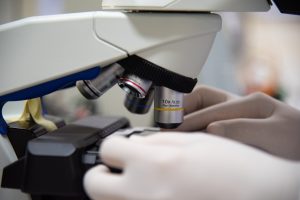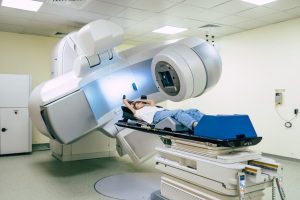
2026 Cancer Statistics
Cancer Death and Diagnosis Statistics for 2026: 2 RCCA Oncologists Provide Insights into the Numbers The latest statistics from the American Cancer Society (ACS) detail
HIPAA Alert: Potential Data Breach Learn More
Questions on Oncology, Hematology and/or Infusion Clinical Services due to COVID-19 Crisis – CALL 833-698-1623
Important Information for Our Patients Regarding the Coronavirus.
RCCA Providing Area Cancer Patients with Access to Care During Coronavirus Outbreak
RCCA Offering Patients Virtual Visits During Coronavirus Pandemic
Routine mammograms have long been a vital part of breast cancer detection. Because most breast cancers do not cause symptoms early on, annual screenings are the most reliable way of diagnosing new cases when they are most treatable. However, different organizations publish varying recommendations for the starting age for annual mammograms, resulting in confusion among women who do not know which guidelines to follow.
Breast cancer and other cancer types are treated at Regional Cancer Care Associates (RCCA), a group of more than 100 medical oncologists and hematologists who provide care to more than 30,000 new patients and 265,000 established patients each year. Following is a discussion of breast cancer, mammograms and the importance of early detection.

Mammograms are a specialized type of X-ray imaging used to detect and diagnose breast cancer. The breast is gently compressed between plastic plates to allow X-rays to penetrate through the tissue. The resulting image reveals abnormalities, such as calcifications and tissue inconsistencies, which may be caused by breast cancer.
Mammograms enable detection of breast cancer long before it starts causing signs and symptoms. This early detection is critical. Breast cancer responds best to treatment while in its earliest stages, where survival rates are between 98% and 100%. This rate decreases as the cancer becomes more advanced. When it reaches Stage IV and has spread to other parts of the body, the prognosis is poor. As a result, the sooner new cases of cancer are identified, the better chance the patient has of survival and successful treatment.
Most healthcare organizations follow recommendations from the U.S. Preventive Services Task Force (USPSTF). This is an independent panel of disease prevention experts who use the latest evidence when suggesting the best way to reduce cancer risks. Since 2016, USPTSF breast cancer screening recommendations have said that women at average risk of breast cancer should start regular mammograms at age 50. The standard was accepted by many healthcare providers, systems, and insurers across the nation. However, on May 9, 2023, USPTSF drafted a revision. The new draft recommends that women at average risk should begin having mammograms at age 40, 10 years earlier than the old guidelines.
The drafted recommendation was endorsed by RCCA and other cancer care authorities, such as the American Cancer Society (ACS). Because it is not finalized, however, it is not yet universally accepted. This has created inconsistencies in mammogram guidelines between organizations. These inconsistencies are only amplified by further disagreements on the recommended frequency. Should women be screened every year or every other year? USPTSF and ACS disagree.
The different recommendations follow different statistics. USPTSF’s original guidelines were based on the average age of diagnosis. Most breast cancer cases occur after age 50, with the median age of diagnosis at 63 in the United States. Routine screening before age 50 seemed unnecessary except in at-risk individuals who benefit from closer monitoring.
In recent years, however, studies have documented an increase in new cancer cases. Among these new cases, the median age is decreasing. Over 10% of diagnoses are in women aged 44 or younger. If routine screening does not start until age 50, these individuals may not have their cancer identified until it is in late stages — reducing their chances of a successful treatment. If routine mammograms begin at age 40, however, younger individuals will have a better shot at survival.
Regardless of the specifics, all experts agree that early detection is essential. This is because early-stage cancer has spread the least. In stages 0, I, and II, the cancer remains very localized. Abnormal cells are found only in a limited area and are easily removed or destroyed through surgery, radiation therapy, and other localized treatments. Once cancer becomes widespread beyond its point of origin, treatment becomes much more difficult.
In recent years, cancer treatment has been revolutionized. New treatment techniques and improvements to old ones have greatly expanded the options available to patients, even those with late-stage breast cancer. Current treatment options include:
With these systemic therapies available, even women with Stage IV metastatic cancer — that is, cancer that has spread throughout the body — can experience better outcomes. Not only that, but they will experience fewer symptoms and a higher quality of life.
In addition to more effective treatments, research has also made strides in reducing their side effects. This allows patients to remain healthier and more comfortable while undergoing treatment.
RCCA physicians offer patients innovative therapies, including immunotherapies and targeted therapy, cutting-edge diagnostics as well as access to approximately 300 clinical trials in community-based centers close to home.
In addition, RCCA’s proximity to patients lets its physicians build relationships with patients and their families. This community-based approach makes it easy for our cancer specialists to coordinate with a patient’s other physicians, allowing for a more personalized and comprehensive approach to breast cancer care. It also establishes trust. RCCA patients receive treatment from providers they know, helping them feel confident in our services.
Though different organizations make different recommendations, the ideal approach to screening is often personal. Every case of cancer is unique. Similarly, no two patients face the same risk. A wide variety of risk factors may be at play in any individual, making cancer occurrences difficult to predict.
Routine mammogram guidelines are generalized. If a person is concerned about breast cancer, or if health or lifestyle factors may put them at greater risk of developing the condition, they should talk with their healthcare provider.
Routine mammograms are the most reliable way to detect breast cancer early. A patient’s first mammogram can be an anxiety- and stress-inducing event. However, you can alleviate these feelings by becoming educated and knowledgeable about the screening procedure and what it involves.
Many individuals diagnosed with breast and other cancer types turn to RCCA, a group of more than 100 medical oncologists and hematologists whose patients have solid tumors, blood-based cancers and benign blood disorders. RCCA has 25 locations throughout New Jersey, Connecticut, Massachusetts, and the Washington, D.C., area, making it possible for patients to receive cutting-edge treatments close to home. RCCA offers some of the best therapies for cancer patients, including targeted treatments like immunotherapy or hormone therapy, following the same evidence-based methods as major academic medical centers.
For more information or to schedule an appointment,
call 844-346-7222. You can also schedule an appointment by calling the RCCA location nearest you.

Cancer Death and Diagnosis Statistics for 2026: 2 RCCA Oncologists Provide Insights into the Numbers The latest statistics from the American Cancer Society (ACS) detail

If you’ve been diagnosed with breast cancer, you may have heard radiation therapy discussed as part of your treatment plan. This approach is commonly used

Cancer and its treatment often impact a person’s quality of life. In the case of prostate cancer, a man’s sex life may be affected. Sexual

Regional Cancer Care Associates is one of fewer than 200 medical practices in the country selected to participate in the Oncology Care Model (OCM); a recent Medicare initiative aimed at improving care coordination and access to and quality of care for Medicare beneficiaries undergoing chemotherapy treatment.